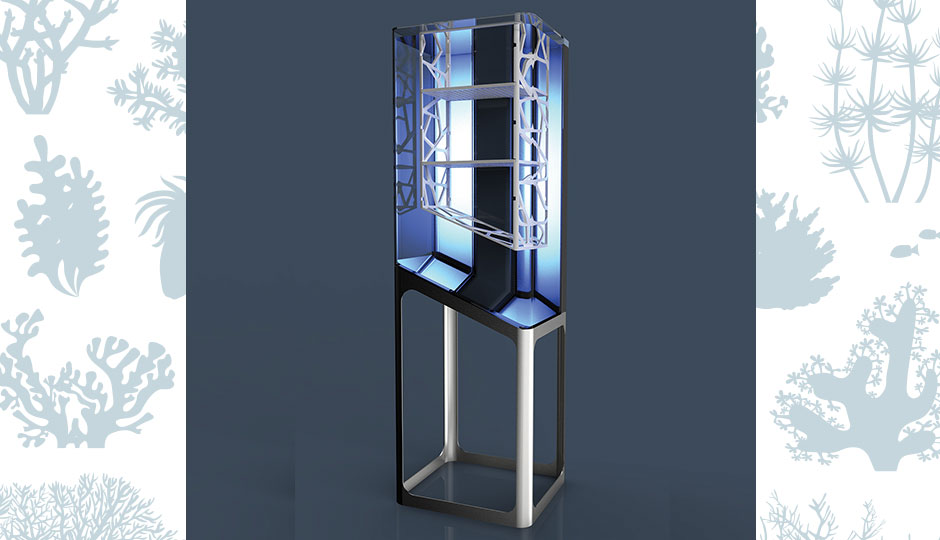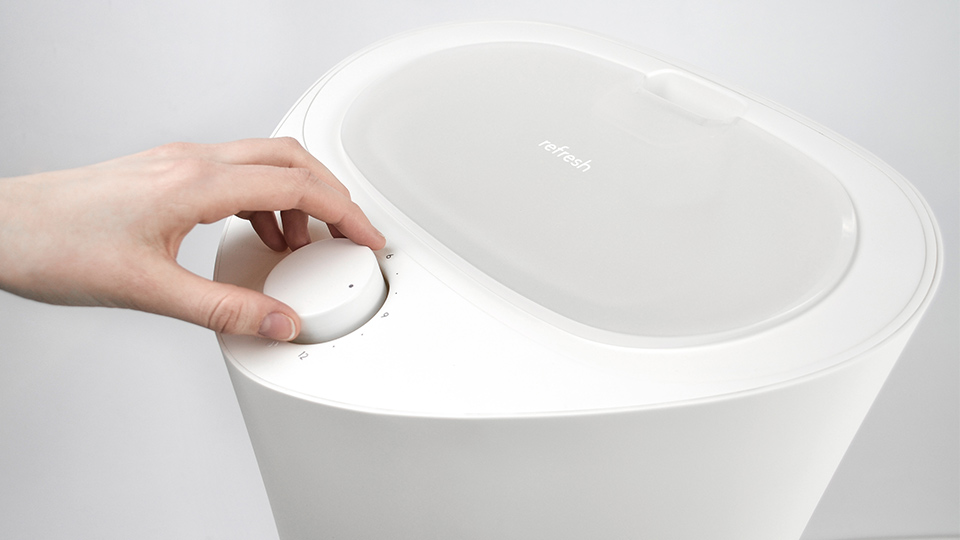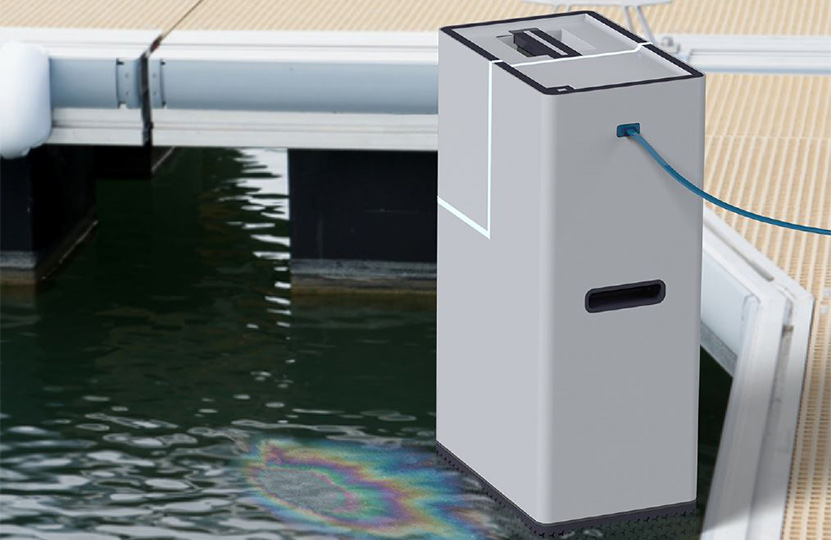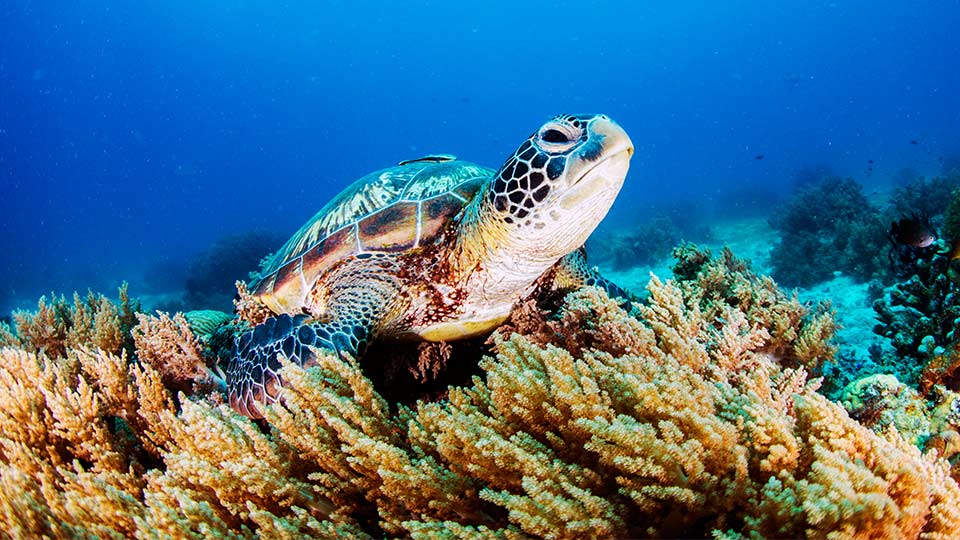Max Benning-Batstone, Emily Russell and Charles Turner have used their passion for the environment to design a coral regeneration device, a clothes-refreshing product to reduce plastic pollution and a filter system that can remove oil pollutants in marinas and coastal waters.
The trio are among more than 100 students showcasing their final year projects as part of the Loughborough Design School Degree Show 2019.
Below Max, Emily and Charles discuss the details of their creative designs, which they hope will make a real splash.
Helping repopulate coral reefs from the comfort of your own home

Generation Reef.
Max Benning-Batstone has designed ‘Generation Reef’ – a regeneration device that allows the everyday person to grow corals at home to help with the restoration of the planet’s dying reefs.
The tank facilitates ‘microfragementing’ – a new process that involves cutting a fully-grown piece of coral into small fragments and growing these into larger self-sustaining pieces.
Max says microfragmenting allows corals to grow at a rate 25 to 40 times quicker than they would naturally and, depending on the species, the fragments can be ready to replant in a reef in four to 12 months.
He envisages Generation Reef being accompanied by a service that will deliver small fragments to individuals and then collect them once they have grown and take them to coral reef foundations, which will test and then replant them in dying reefs.
Though there are marine tanks currently on the market that can house coral, Max says there are no tanks designed specifically around growing coral for the purpose of regeneration.
Max, who has a working prototype of the product and a functional prototype simulating the filtration equipment, said: “It has been predicted that only 46% of the world’s coral reefs are in good health and at this rate of damage more than 90% will die by 2050.
“I wanted to produce a product that would allow for the everyday person to be able to give back and help our oceans.
“This product provides the optimal environment for growing coral in an overall form that is aesthetically desirable.”
Reducing plastic pollution by rethinking how and why we clean clothes

Emily's clothes-refreshing product.
Between 600,000 and 17 million clothes fibres are released in every 5-kilo wash yet neither washing machines, nor sewage treatment plants are equipped to trap these fibres meaning they easily end up in the ocean and eventually the food chain, states Environmental Pollution.
This is an issue as most clothing consists of synthetic materials or a mix of natural and synthetic fibres meaning tiny plastics called microfibres are shed when they are washed, and these end up polluting the planet’s oceans.
Emily Russell is hoping to tackle the problem with her clothes-refreshing product, which reduces the frequency that items need to be washed in a conventional washing machine and stops microfibres being produced.
Her design works by using steam to kill odours as well as remove dirt and stains from worn garments, and clothes can be cleaned and dried in the device in as little as 15 minutes.
The steam is also recaptured and condensed for future uses, reducing water use – another issue prevalent with conventional clothes cleaning methods.
Emily, who has an early working prototype, said: “Rather than designing a filter or a product to catch the microfibres in a washing machine, I wanted to create a product that actually solved this issue and eliminated these microfibres being produced in the first place.
“Many people wash their clothes because they may have a slight odour or may have been worn once, rather than because the clothes are actually dirty or stained.
“I believe that by choosing Refresh we have an equally effective solution that is significantly more sustainable for our planet.
“I am determined to raise awareness of the microplastic pollution problem that we all face, and I hope my product can help.”

Charles hopes his filter device will allow "boat owners to enjoy coastal waters in an environmentally responsible manner".
Charles Turner has created a filter device that has the potential to improve the state of delicate ecosystems in shallow coastal waters by removing oil-based pollutants such as diesel and engine oil.
His design works by drawing in contaminants, which build up on the top surface of the water, and physically removing them from the surrounding water.
The device comprises a pump, which pulls in the contaminated water, and internal absorbents, which absorb the oil and allow treated water to return to the marina or coastal waters.
Charles has a working, functional prototype and has also designed a service to support the product so the toxic waste can be disposed of in the safe and correct manner.
“The product provides a sustainable solution which allows boat owners to enjoy coastal waters in an environmentally responsible manner,” Charles said.
“The initial concept was presented to me when I was living in Poole on my placement year – I would regularly visit the coast which was beautiful for the most part, expect from the build-up of pollutants in marinas and harbours.
“There is also very little on the market which aims to combat small-scale, fuel run-off and accidental spills surrounding coastal waters.
“I always hated the idea of producing a product that didn’t contribute to a bigger end goal of helping society grow and I felt like this project would give me the opportunity to help preserve and protect the environment.”
For more information on the Design Degree Show 2019, click here.
